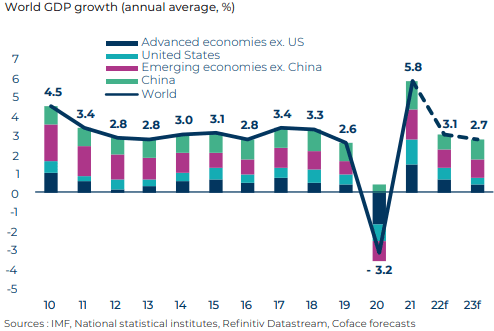French credit insurer Coface projected «dark clouds» in the world economy in 2023 and has downgraded the country risk assessment of 16 countries on the European continent.
This downgrade includes the major economies -with the exception of Italy, which was already rated at A4, the highest risk level in Western Europe.
According to its barometer for the second quarter of 2022, in an environment characterized by tightening credit conditions, the construction sector appears as one of the most vulnerable.

It is therefore affected by a large number of downgrades, especially in Central and Eastern Europe, but also in Western Europe and North America. It is currently considered a «high» or «very high» risk in all regions.
Coface expects rising borrowing costs to affect the housing market and ultimately construction activity.
This has begun in the United States, where home sales are declining rapidly. After a very strong recovery over the past two years, rising mortgage rates (+200 basis points since the beginning of the year) and house prices (+20% year-on-year) are cooling demand.
Also in the United States, as in the rest of the world, the sector is facing rising input costs, especially for lumber, which remain high.
Coface
Although in recent months most governments have rushed to implement measures to support households and, to a lesser extent, businesses, persistently high public deficits are already raising doubts about the sustainability of public finances in some countries in an environment of rising interest rates.
According to Coface, this is particularly true in the Eurozone, where the effects of the cessation of net bond purchases by the ECB and the start of interest rate hikes will combine.
Even before this change in monetary policy stance materializes, this simple prospect has led to an increase in lending rates for all countries in the zone and, above all, an increase in the spread between the country with the most favorable financing conditions, Germany, and the others.
As a sign that the market discrimination mechanism has already started to kick in, as is often the case in times of crisis when risk aversion is at its highest, the spreads of Italy and Greece, the most indebted countries in the eurozone, have risen much faster than those of the other members.
![]()

